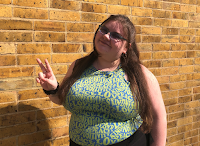EDI: Why Does It Matter to Use Someone’s Preferred Pronouns?
Tell us about yourself
I’m Chloe McKendrick and I use she/her and they/them pronouns. I am currently the Marketing Executive at Herts SU & Co-Chair of LGBTQ+ Staff Network. I graduated in BA(Hons) Politics & International Relations in 2021.
What does Pride mean to you?
It’s Pride Month from 1 June. Pride means the opportunity to be unapologetically me. It’s a time to celebrate the LGBTQ+ community and raise awareness of the issues we continue to face. It’s an important time to uplift LGBTQ+ voices, bring people together and celebrate the wonders of inclusion and diversity.
Can you tell us what pronouns are?
Pronouns are what we use
to refer to people when not using their names. Pronouns are an important part
of someone’s gender identity. Some
people use gender perceived terms including she/her and he/him but there are
many more pronouns that are actively used throughout society.
Some trans and gender
non-conforming people may use gender-neutral pronouns including they, them, and
theirs.
People can also use more than
one set of pronouns to refer to themselves. For example, a gender non-conforming
person may feel equally comfortable with they/them, he/him or she/her pronouns.
If someone does use more than one set of pronouns, feel free to ask what they
would prefer you to use. Additionally, they may prefer you use all of them
interchangeably or to just keep to one set.
Neopronouns are newer pronouns used by individuals to refer to themselves without the context of gender. These include xe/xir or ze/zir, both pronounced zee and ze-er.
Why do pronouns matter?
Pronouns are incredibly important to the LGBTQ+ community as it refers directly to an individual’s identity.
How do I check someone’s pronouns?
Never be worried about asking someone’s pronouns. Firstly, introduce yourself with your own pronouns, people often reciprocate. Actively bring pronouns into your everyday conversation. Secondly, people may also add their pronouns onto their social media profiles or email signatures so do actively check there! Additionally, someone may be wearing a pronouns badge. See if you can spot one! Finally, don’t be nervous to ask. Without starting the conversation, we can’t normalise it.
How do we make sure we have an inclusive space for students at Herts?
There are simple changes you can make to your everyday life to
make sure we have an inclusive space for students here at the Uni of Herts.
Firstly, you can add your pronouns to your social media profiles and email
signatures. This small addition can instantly make students feel comfortable,
knowing they can openly share their pronouns with you will actively support the
LGBTQ+ community.
Additionally, it is important to give students the opportunity to educate themselves and celebrate equality, diversity, and inclusion through recognising key months of the year including Pride and LGBT+ History Month in February. These key months allows students and staff the opportunity to meet people in their communities, celebrate themselves but also learn about how to increase their ability in inclusion.
If anyone would like to find out more, what are your tips?
Don’t be nervous about asking someone’s pronouns – bringing the
topic into your everyday conversation normalises any idea of stigma around it.
Remember, pronouns can change. Make sure you’re continually bringing
pronouns into your conversations.
For more information on expanding your knowledge around pronouns and how you can introduce them into your everyday life, join me for my Pronouns Workshop on 28th June.
